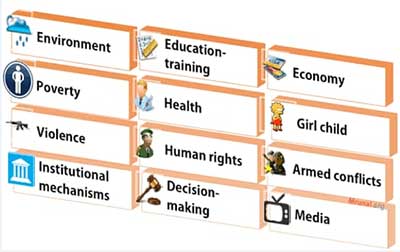UNESCO to review outcomes of Beijing Declaration and Platform for Action on gender equality
UNESCO Director-General recently joined world leaders’ call for highest political commitment to achieve gender equality. For this UNESCO will review the outcomes of Beijing Declaration and Platform for Action on gender equality . 2020 is marking the 25th anniversary of the visionary Beijing Declaration and Platform for Action (1995) that set a global agenda for the empowerment of women and girls and called for the recognition of women’s rights as human rights. 4th World Conference on Women took place in 1995 .
As part of a 25-year review of progress, and as a contribution to UNESCO’s 2020 Global Education Monitoring (GEM) Report’s Gender Report, UNESCO and the GEM Report commissioned a series of case studies to take stock of how selected strategies recommended in the Platform have been implemented in 11 countries around the world.
The case studies from Argentina, Sierra Leone and the United Kingdom show how early pregnancy hinders girls’ education, and what steps have been taken to remove barriers to formal education for pregnant adolescents and young mothers. Case studies from Brazil and Bulgaria show there is still a long way to go to achieve equality between women and men in the education workforce, despite some positive developments since 1995. Case studies from Comoros, Ethiopia, and Nepal also reveal mixed progress in the development of curricula, textbooks and teaching aids that are free of gender-based stereotypes and bias.
According to UNESCO , Evidence suggests that women and girls are hit hardest by economic down-turns, violence, conflict and climate change, and the COVID-19 crisis has proved no different.
More than 767 million girls were out of school due to the COVID-19 lockdowns, 11 million of whom are unlikely to return to school. According to UN-Women, the pandemic will push 47 million more women and girls below the poverty line.
Gender-based violence and gender digital divide status :

According to UNESCO , only 54% of women connected to mobile internet. This limits the access of millions of women to information and to a diversity of information sources that is necessary to sift out disinformation. Gender-based violence increased dramatically during lock downs around the world. Women scientists, journalists, artists and creators found and continue to find themselves at increased risks of different forms of harassment, censorship and abuse, both online and offline.
About The Beijing Platform for Action:
In September , 1995 Nearly 17,000 participants and 30,000 activists streamed into Beijing for the opening of the Fourth World Conference on Women. They were remarkably diverse, coming from around the globe, but they had a single purpose in mind: gender equality and the empowerment of all women, everywhere.
Two weeks of political debate followed, heated at times, as representatives of 189 governments hammered out commitments that were historic in scope.

Thirty thousand non-governmental activists attended a parallel Forum and kept the pressure on, networking, lobbying and training a global media spotlight. By the time the conference closed, it had produced the Beijing Declaration and Platform for Action, the most progressive blueprint ever for advancing women’s rights.
As a defining framework for change, the Platform for Action made comprehensive commitments under 12 critical areas of concern. Even 20 years later, it remains a powerful source of guidance and inspiration.
Critical areas of concern :
- Women and the environment
- Women in power and decision-making
- The girl child
- Women and the economy
- Women and poverty
- Violence against women
- Human rights of women
- Education and training of women
- Institutional mechanisms for the advancement of women
- Women and health
- Women and the media
- Women and armed conflict
The Platform for Action imagines a world where each woman and girl can exercise her freedoms and choices, and realize all her rights, such as to live free from violence, to go to school, to participate in decisions and to earn equal pay for equal work.







